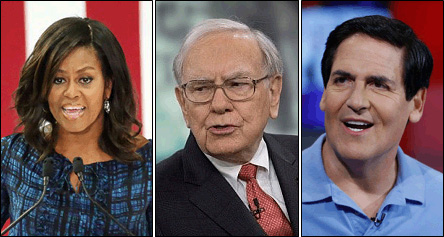As we all idly wait for the debate to start, here’s an interesting question related to my previous post. I noted that “no matter how personally or politically destructive it is, Donald Trump is flatly unable to ignore an attack from anyone of influence.” Nobody disputes this as a general proposition, but several people pointed out to me that there have been a few folks who attacked Trump and avoided return fire. Michelle Obama is one. Mark Cuban is  another. Warren Buffett is a third—and Trump even publicly acknowledged he planned to leave Buffett alone. “There’s no counter-punch,” he said.
another. Warren Buffett is a third—and Trump even publicly acknowledged he planned to leave Buffett alone. “There’s no counter-punch,” he said.
There aren’t a lot of examples of this, and I suppose you could say that even Donald Trump doesn’t have enough hours in the day to attack everyone who’s been nasty to him. But these are all big names, of the kind that he’d normally respond to. So what stopped him? It’s not gender: he attacks both men and women. It’s not power: he attacks plenty of powerful people. It’s not money: he’s taken on Michael Bloomberg and Carlos Slim.
So what’s the deal? How does that feverish brain of his decide who not to attack? Is it popularity? Maybe he’s careful to only counterattack people who aren’t especially popular. Ideas?

















